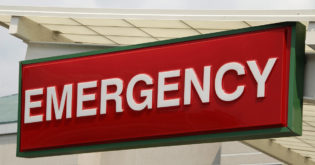Emergency Room Visits: What to Expect
January 31, 2020 According to the Centers for Disease Control and Prevention (CDC), more than 145 million men, women, and children go to emergency departments every year. The experience can be an overwhelming, scary, and stressful one – but there are certain things to know about navigating the E.R. that can simplify the process.
According to the Centers for Disease Control and Prevention (CDC), more than 145 million men, women, and children go to emergency departments every year. The experience can be an overwhelming, scary, and stressful one – but there are certain things to know about navigating the E.R. that can simplify the process.
First things first: if you are experiencing a medical emergency, call 9-1-1. A medical emergency is a sudden onset of symptoms of sufficient severity, such as severe pain, which in the absence of immediate medical care could seriously jeopardize a patient’s health. Patients should know that emergency departments prioritize medical emergencies over more minor (e.g. broken bones, stomachaches, or headaches) complaints.
Emergency Rooms: The Step-by-Step Process
Before going to the emergency room (assuming you are not experiencing a medical emergency requiring transportation via ambulance), there are a few things you can do to prepare for your visit. Here are some useful tips and timesavers:
- Make sure you have your identification and insurance cards,
- Have a list of all medications and supplements you take, as well as notes on any chronic health problems and allergies,
- If possible, have a friend or family member come with you (both as a patient advocate and support system), and:
- If you have recent diagnostic or laboratory tests, bring them with you.
When you arrive at the E.R., you will first check in at an admissions desk. The next step is to be evaluated by a triage nurse. He or she will determine the severity of your medical complaint, and designate a priority number (which patients are then seen in the order of.) Some healthcare providers refer their patients to emergency departments; if your doctor referred you to the E.R., it is a good idea to have the office call ahead of time to relay important medical information so the hospital can be prepared for what to expect.
One important thing to remember is to report any change in symptoms while waiting to be seen. For example, if your symptoms worsen or you suddenly develop new ones, be sure to tell the admissions desk what is going on. This is critical, because sudden changes in symptoms can indicate something serious requiring priority medical intervention. At the same time, remember that going to the E.R. for non-emergency medical complaints like sore throats, eye infections, cuts that needs stitches, or even bad colds, can come with extremely long wait times. Some emergency hospitals have “fast-track emergency rooms” designed for treating patients with less serious medical issues, but not all.
Healthcare representatives also recommend that patients learn the names of their doctor and nurse once they have been assigned an E.R. cubicle. If you have questions about your treatment instructions, a diagnosis, or even whether or not it is safe to eat or drink, try to speak directly with your assigned providers – they are the best ones to ask about your case. When you are being discharged, make sure you understand the instructions and have a contact number to call in case your condition worsens or changes.
Food for Thought: Urgent Care Centers
There are more than 8,100 urgent care centers serving somewhere between 150-200 million people across the United States. Urgent care facilities are designed to provide easy, generally affordable access to healthcare at times when a primary doctor is not available, and when emergency medical attention is not necessary. While all urgent care centers are equipped to deal with non-emergency conditions like colds and other minor infections, some can treat sprains, fractures, and wounds – and others provide blood testing, diagnostic tests (e.g. X-rays) and stitches. If you decide to visit an urgent care facility, make sure to ask about insurance options and costs at the admissions desk before being seen.
If you have questions or concerns about the medical care you received at an emergency department or urgent care facility, someone at our firm can help. Please contact a representative directly.
Philadelphia Medical Malpractice Lawyers at Galfand Berger, LLP Representing Injured Individuals Since 1947
Galfand Berger has offices located in Philadelphia, Bethlehem, Lancaster, and Reading our attorneys serve clients throughout Pennsylvania and New Jersey. To schedule a consultation, call us at 800-222-8792 or complete our online contact form.
 Google Screened
Google Screened
